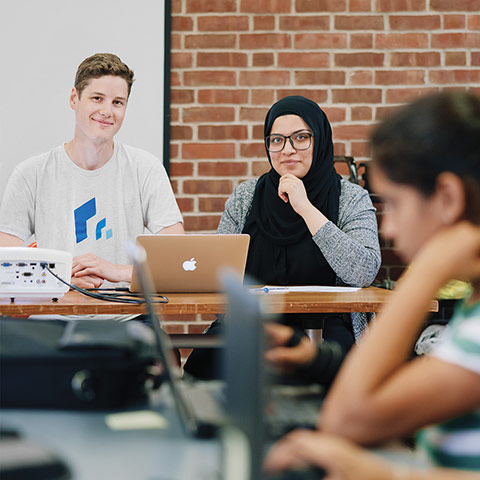On a warm summer evening in July, Will Ginsberg, a lanky fourth-year U of T computer science student, wanders among a group of kids peering intently at their laptops. For much of the next two hours, he’ll be helping his 11 young charges at a west-end Toronto library troubleshoot their way through the latest activity in a coding boot camp: creating an aquarium image to post on a website they’re designing.
“Try control-X and then control-V,” he amiably advises one participant. To another: “You know what I forgot to tell you yesterday? You got the question-of-the-week prize!”
The boot camp, which is the main part of a larger initiative called “Project Include,” is geared at 10- to 19-year-olds and was created by a group of U of T engineering and computer science undergrads. Launched in 2016 by Inioluwa Deborah Raji and Afifa Saleem, Project Include runs the camps out of library branches in selected priority neighbourhoods around the city, using donated space and rented computers.
The inspiration came from an insight Raji had about access to technology. She wondered whether children from lower-income families who didn’t have computers were less likely to pursue coding, a highly sought-after labour force skill.
The available research doesn’t provide a clear answer, but Jacqueline Smith, a U of T professor of computer science (teaching stream), suggests this kind of program helps kids – particularly those from underprivileged backgrounds – envision themselves in a career they may not have considered before. “It builds confidence,” she says.
Raji and Saleem asked Google to support the project. The company provided a $4,600 grant last year and more than doubled the amount for this summer. U of T also kicks in funds.
The boot camps are free for participants, and this past summer reached 140 children at 10 branches. The program fills up quickly, and there’s a long waiting list, says Saleem. On a survey, many of this year’s participants said they tried the boot camp out of curiosity. “I don’t know what I want to learn,” one commented. “I just am interested in learning new things.”
Eleven U of T undergrads have signed on to teach these sessions, which instruct kids in how to build and test websites, apps and basic computer games. Ginsberg points out that each child gets their own laptop to use during camp sessions, so they can work on their own coding projects individually, using various programming languages. He learned quickly that the best way to run these sessions is to let the kids loose on a series of small projects. “I try not to lecture at them, ever,” he says with a chuckle.
Back at the library, several of the kids raise their hands to tell Ginsberg that the Internet connection seems to be down. He takes a seat at the front and starts walking them through the day’s activity, using his laptop and a digital projector. “I’m just going to do this offline,” he says.
But even as he’s talking, several kids have redoubled their efforts to coax out the library’s Wi-Fi signal. After a few moments, one of Ginsberg’s young coders pipes up: “Chrome’s working …”
Recent Posts
For Greener Buildings, We Need to Rethink How We Construct Them
To meet its pledge to be carbon neutral by 2050, Canada needs to cut emissions from the construction industry. Architecture prof Kelly Doran has ideas
U of T’s 197th Birthday Quiz
Test your knowledge of all things U of T in honour of the university’s 197th anniversary on March 15!
Are Cold Plunges Good for You?
Research suggests they are, in three ways





